Underestimating and undervaluing
I think many woodworkers underestimate the value of both their hands and the hand tools we use in handwork. Undervaluing our own ability to master handwork to an acceptable level often leads to giving up well before we can experience the wonders of skilled work for ourselves, even when we are likely to be just a few strokes away from some level of success. Could this be because we just never expected to actually achieve something good? Often, I see this as more a sad condition of our present world where making anything is becoming rarer and scarcer. As a child, my mother, an apprenticed Belgian dressmaker with a lifetime of full-time experience making, sent me to the grocery store to ask for orange and apple crates. Today, these have been replaced by corrugated cardboard and plastic. My requisitioning small wooden crates was a family source of starter firewood to ignite the coal we burned for heat and water. How many people give a ten-year-old an ax and tell them to go and chop firewood. My early relating to wood was through chopping thin wood into sticks. It was through this seemingly mindless task that I came to know about knots, cross-grain chops, splitting, warpage, texture and much more. A simple ax, together with a screwdriver for a wrecking bar, taught me many things woodworking. Thus, wood soon became a resource for my early boat models and boxes, den walls and more. It led to my using a dull handsaw, some chisel working, knife shaving and shaping and other such fascinating relational knowledge. Could this have prefaced my idea to become a woodworker when I grew of age? There are always assumptions that follow such introductions to life skills. I had an academic once moan in a class I was teaching and say, “I am an intelligent being! People with much less intelligence can do this work better than I can. Why is this so?” Yes, I know, it was such false assumptions that enveloped him in unbelief. He assumed that manual workers were thick, dense of wit and wisdom. It was this that held him back the most. Such assumptions can do that for all of us.

A NASA scientist in my class of 20, fifteen or so years ago, understood skilled handwork better than anyone I know. His engineering mind began on the workshop floor where he first mastered mechanical engineering using machines and handwork. This had equipped him to work on multiple long-range space projects and his mind had not overly constrained him but had equipped him to make the correct assumptions in relation to both manual working and then his use of brainpower. Assumptions can be and often are the result of being misled by bad evaluations. We can be overly ambitious and make bad decisions in our enthusiasm. That said, some, many, have made very risky decisions that resulted in dynamic successes.
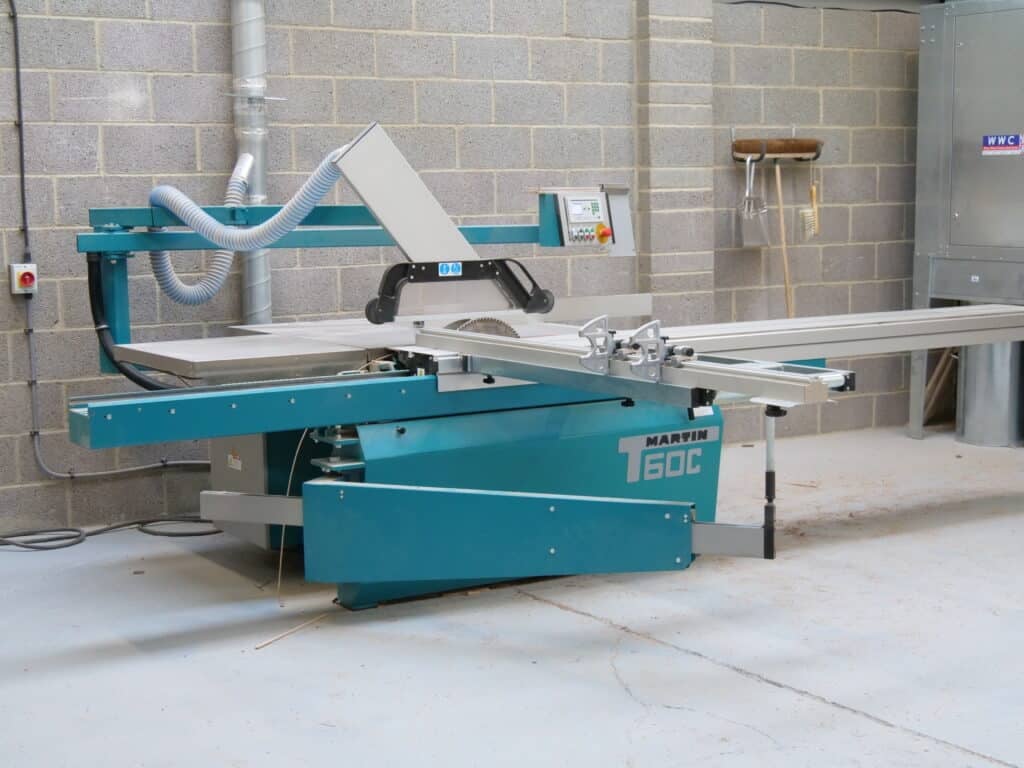
Programming or setting up a machine to cut perfectly parallel and perpendicular cut lines and recesses seem to automatically disqualify hand tools for most makers these days. Thankfully, there are those of us who like and even prefer the idea of self-developmental challenges. In this world, my now evolved world, where relative peace reigns despite the challenges, any slight discrepancy does not mean failure but successful hand-making in realms of greater silence, skilfulness, safety and more. It’s in my world of handwork where I gain intimate and infinite levels of satisfaction that run in tandem with peace and deliberate energy levels. Using hand tools in my work delivers the most perfect levels of expended energy with zero waste of those ever-important energy levels!
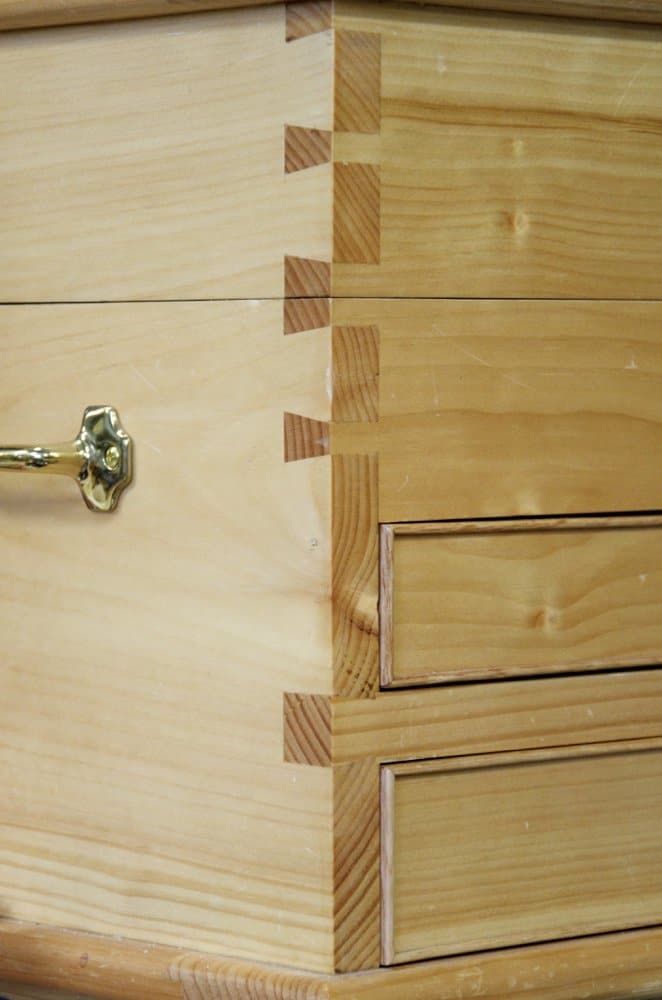
Estimating the speed with which we learn to master techniques and skills can be difficult to evaluate and assess because it’s time-related learning that can hardly be measured in bits, bites and bytes. Additionally, for many, that means short and medium jabs of working in small to medium segments of time; more usually, woodworkers work mostly part-time with many breaks in the continuity that would defy establishing skill-building more quickly. This is frustrating, of course, but we do whatever it takes because, well, we want the experiential learning we get in the doing of it. When I started teaching, I created exercises thinking the more exercises you did the quicker you would learn. I soon learned that, whereas my approach seemed logical, that’s not necessarily the case. I found that project-based making adds a dynamic that cannot be quantified. The project itself becomes the dynamic that inspires people to extend themselves beyond anything they may have done before. Project-based learning carries within it an energy that highlights the need for extra care and extra accuracy in every aspect of the making process. This extra spin value compels students to investigate and seek out answers as they are in the saddle, so to speak. In this, they learn far more readily knowing that there is a project to be completed and at the end of a day’s working they will have something by which they can measure the quality of their newly acquired skills. Whereas they were uncertain as to what they could realistically accomplish, I pretty much relied on the fact that almost all my students, those standing on the other side of my workbench watching me, would do just fine. The biggest input I made into the world of amateur woodworkers using and wanting hand tool woodworking was believing that within them lay dormant skills as yet untapped and unknown and unmeasured. I had worked out what the core essentials were that they would need immediately on starting the journey towards good craftsmanship. For many, telling them about the knifewall somehow unlocked and unblocked the logjam of doubt they had about themselves. They saw the sharp point of the knife go in, the chisel sever and separate for a stepdown and a saw follow a perfectly straight and vertical cut. When they saw this, I had them. They saw it, they knew it, and once they knew it they owned it. It was not something that I was ever taught but something I knew of before as simply ‘marking‘ and ‘striking and ‘layout‘. Knifewall was the term I coined to describe what was hitherto unnamed. It brought pure clarity to what had just happened. The misnomers of marking, striking and layout marks were gone forever. These terms gave no sense of severing fibres with slicing cuts and of course, a conically-pointed cone of steel did no more than indent the surface with an elongated, bruised furrow. Hence, back in the early 1990s, my students willingly adopted the term, and today, at least in the realms of woodworking, knifewall as a description is pretty well universally accepted; a whole new word for woodworkers and one that I established in my own vocabulary without ever realising the word would spread because it explained exactly what it created. It has become a word I have now used for these past 30 years.
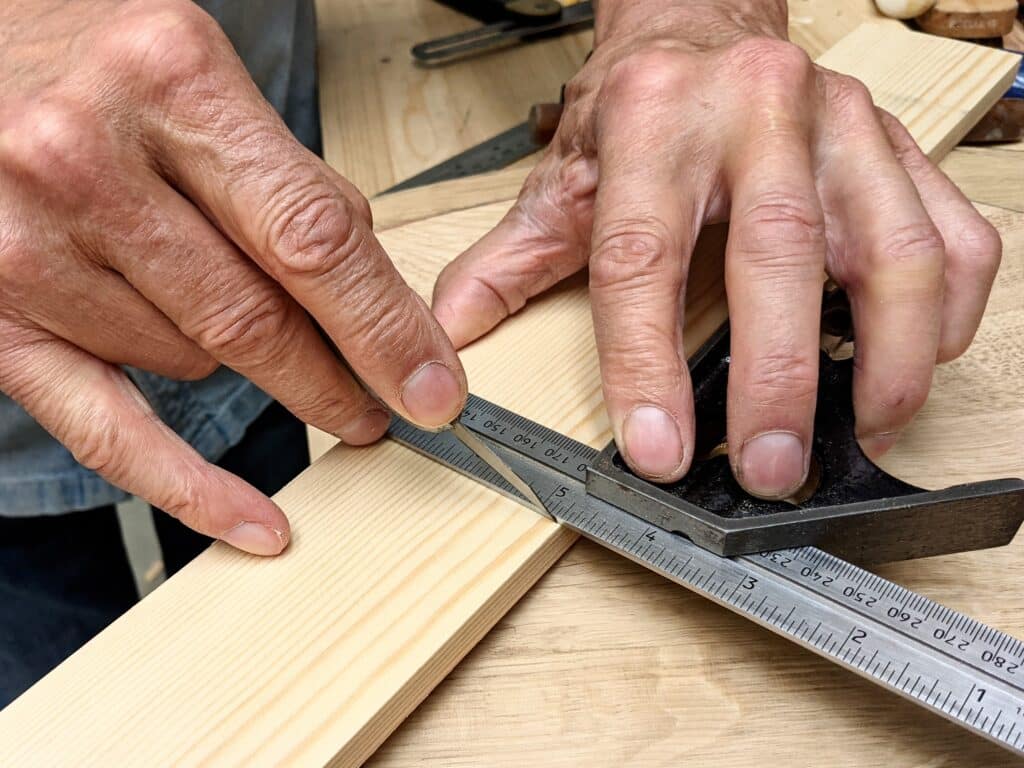
In many ways, this is to say that we should not underestimate or undervalue our ability to change the status quo and especially if what was so was purely for the sake of tradition. Laying planes on their sides is yet another silly practice unless you are hanging a door and working outside on rough ground, gravel and concrete. Inherent in our humanity is our ability to improve durability to work and this is intrinsic to who we are as workers working with our hands. Every human born with hands or a hand is born with the ability to work with what they are born with. There are only few exceptions. That being so, we should never underestimate our innate ability to develop skill of almost any kind. As sentient beings, we almost automatically create, and the more we do of any one thing, the better our senses enable us to adapt so that we become developed to do what we are doing and do it well. If then, we are patient in our knowledge that development comes with patience and determination, we can expect to become competent and even experts. I consider this to be like driving a car that once felt clunky and awkward to being able to multitask in the driver’s seat by shifting gears, braking, steering, turning on the radio, adjusting the sound levels and clicking various switches seemingly at the same time. Whereas I dispute whether one half of the world’s population multitask any better than the other half, this is one area where I accept that multitasking is not doing half a dozen tasks at once badly. In my purview, the perspective of multitasking being advanced abilities in some people is quite distorted. For the main part, it is the prioritising of many small tasks to put them in order for expediting in synchrony with ultimate need and nothing more.
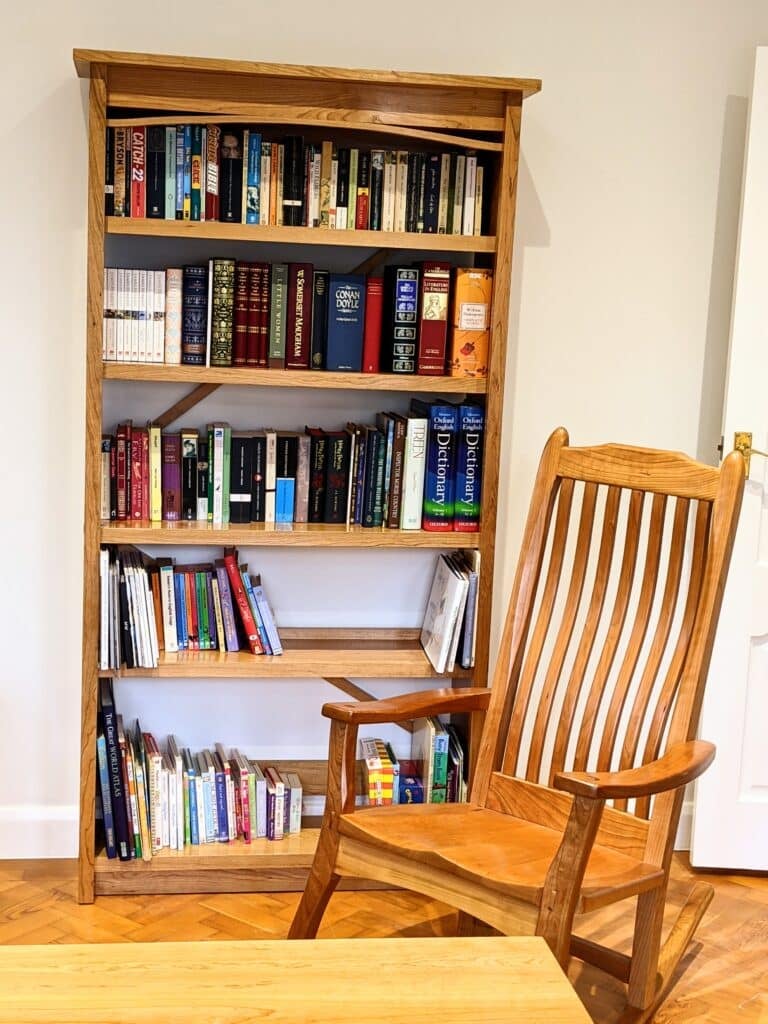
Persevering is the key to advancement in any craft. Those who find themselves self-deprecating are often modest about their abilities. Overcoming the fear of failure can be key to development, but accepting that we do indeed have abilities still yet lying dormant within can be the bigger challenge. Often, not always, we are told that we can’t do it by some other who even unintentionally tells us we can’t. “Oh, you know what you’re like! You’ll never do it!” and we give up without trying. Such condemning thoughts and phrases are often difficult to overcome. I don’t think I have ever used such phrases in my life. Secure in my knowledge that dormant interest often needs additional third-party input, energising support usually comes from someone who cares to be that encourager, teacher, mentor. I have seen many thousands of my face-to-face students overcome self-doubt and the doubts of others to succeed in their endeavour, with many going far beyond their wildest expectations. By this, I know we can all steadily gain some measure of success. This is why we should never underestimate or undervalue the human mind and body in our making.
In some ways, we often fail to see that our inabilities are a form of disability. Once, an old man stood outside a revolving door for the first time. A friend of mine stood on the opposite side saying, “it’s OK, wait for the gap and step in.” She could see him hesitate each time the gap came and eventually she just shouted, “Go! Now!” and he did. He kept going, came out the other side, and he smiled to himself as he walked away. I recall similar things with my own first encounter with an escalator, a moving walkway and other such automated ‘people movers’. Our hesitancy sometimes causes us to falter and miss that critical point of entry. Sometimes we are fearful of starting something we are uncertain about. Disabilities are mostly hidden and not obvious to others at all.
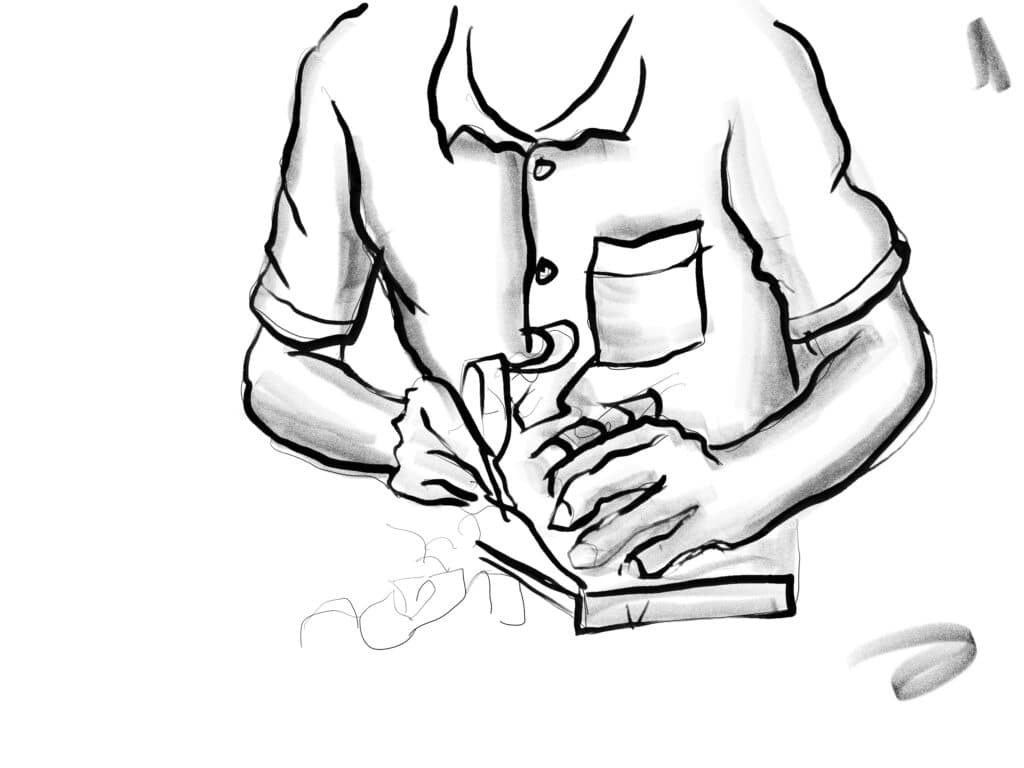
Disabilities can be the result of other factors too – not so much a physical disability – perhaps ones more closely linked to our emotions and our sociological and socioeconomic ones. Anxiety can be very debilitating; as much so as any physical disability. Lack of finance, lack of direction, lack of tools and equipment, lack of teaching and instruction. These too can be highly disabling. What about motivation too? What if you do have a disability on top of everything. Some disabilities can actually equip you and then dis-equip you. I think of autism as an instance here. Disabilities run the gamut for all of us. I see the whole of life as a spectrum. At one time, in my own life, I recognised my own disability when I had been offered a job for a season but one morning my own self-doubt prevented me from going into the workplace. I sat outside in my car for four hours unable to move; I neither wanted to leave nor go in. It seemed ever-more crazy as the hours passed. I was in my late 50s when this happened for the very first time. How could this be? I was more than confident in my work and my physical abilities. My work was in the White House. I’d traveled from state to state and taught many hundreds of thousands how to work with their hands. Just what was going on? Could I walk through that door? The funny thing is this. I can stand in front of an audience of five or 5,000 and speak for an hour with no problem. The cameras I present to never cause me an issue. I can be interviewed live about a variety of issues and can think of none that would cause me to falter. Self-doubt can affect all of us negatively at some point – even the most confident.
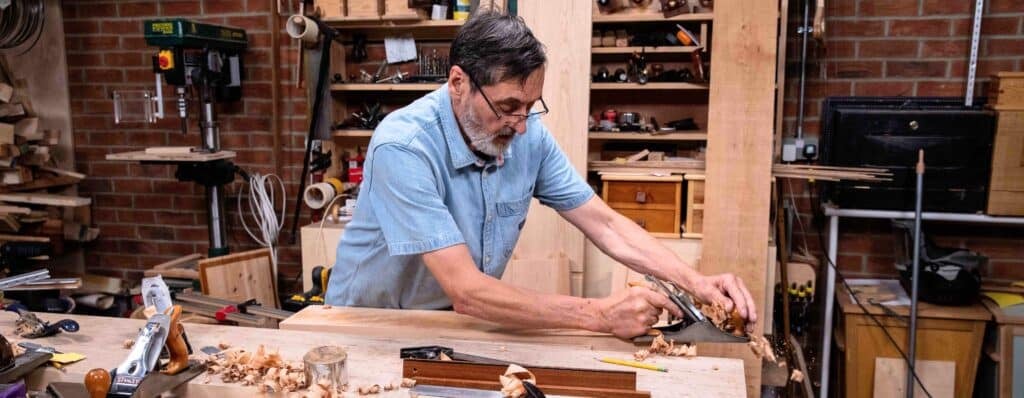
Sometimes we need just a small nudge from another. It comes best from someone who cares for us and has genuine interest in what we do. Likewise, when we experience negativity from another, or just from ourselves, we can hold back from achieving what is just a plane or a saw stroke away. What we held deep in our hearts for a long time can vanish in a wisp of air if we don’t just step out and do it! So, what am I saying? Doubt your doubts and trust that you will achieve when you release yourself from self-doubt, fear of making mistakes. Most often, you can do it.
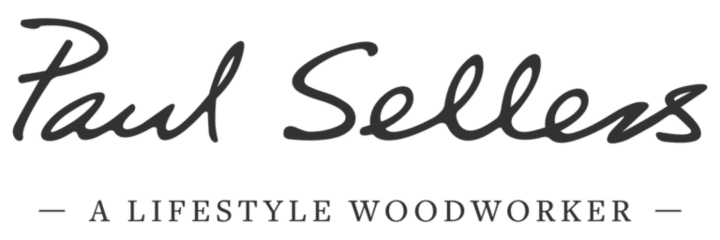

One of your most captivating articles that I have seen and read! You have been a beacon in my late starting journey. As a wee child of five my dad took me everywhere and always put me to work. He instilled in me a confidence that has served me well over my years. After he passed when I turned seventeen my life was in limbo for quite a while. About the age of twenty three or so I met a gentleman that was old enough to be my father. He was also a self taught man very similar to my father and refined and taught me how to apply much of the knowledge my father had imparted on me. Now here I am at 65, having followed you first on YouTube and then your blog and I must say you have reignited the fire in me to pick up and continue where I left off. Thanks Paul for all that you do and have done.
Hi Jack,
Sorry for your loss at such a tender age. Sometimes family is who we adopt. I think of Paul as my foster grandfather…a little crotchety, ornery, stubborn, and damn good at his craft.
Best wishes,
Jeff D.
Thank you once again in making us believe in ourselves! You are surely an inspiration for us folks!
Excellent article. Thank you once again!
What I had all prepared to say, was clearly stated by Mr. Collins. Thank you, not only for your knowledge and experience; but for your willingness to share it!
I once told myself that I could not french polish because it was a skill that was not taught these days. I looked it up on uTube and told myself ” I can do that” and I did.
Yes, Paul, we have probably all hit that wall and try as I might in school I could not get into the woodworking classes the school ran. However, my dad let me putter in his workshop and I learned by myself or by watching others. I have met the roadblocks and discovered that I could probably overcome all of them with some persistent effort. Its so much easier now with all of the vids on the internet but I have come a long way on my own without any support. As usual your chats are very informative in helping to put all of this in perspective. Keep up the great work Paul.
Dear Mr Sellers
I just want to say thank you kindly for all of “us”!
Best Regards
Petrus Swart
Well said Paul. I think we all suffer from self doubt. It’s not an easy thing to dispel from our minds, but to carry on what we love to do we have to. It’s the biggest problem that I suffer from, it causes anxiety and stress to ones self and affects the way we work. You are constantly scrutinizing you work and the more you do the more you think is that the very best I can do or should I just throw it in the waste bin. But the sheer enjoyment you get from making something with hand tools and your bare hands keeps you going. I ask the question is it normal to self doubt you self and the work you do, is it normal, or is it just a frame of mind and more importantly how do you over come this.
Great insights sir.
Good post
It is as if you wrote this post directed at me. Thank you Paul for the words of encouragement. I am working hard to change my way of thinking, but old habits die hard. I will persevere. There is nothing like the satisfaction I get when I am making with my hands.
“When I started teaching, I created exercises thinking the more exercises you did the quicker you would learn. I soon learned that, whereas my approach seemed logical, that’s not necessarily the case. I found that project-based making adds a dynamic that cannot be quantified.”
Repetitive exercises is a typical academic approach which makes learning boring. It is like learning another language by first learning all the grammar rules.
Thank you for all the project you have shown while explaining why and how to.
On thing I regret is having procrastinated a few years before doing my P.S. type workbench. This year I have made a Moravian workbench for the son for the challenge of (big in any direction) angled tenons and mortises. It wasn’t really difficult thanks to the skill acquired.
To do it, my P.S. workbench was so much better than the Workmate I had to use to make it.
Whilst tidying my bench last night I was pondering the recent doubling plus in the price of the CLS timber that I made it from. My bench must have doubled in value since this happened. Not sure that i would pay this for the timber now, would look for a cheaper source, perhaps laminated pallet timber or a different source.
Paul.
I was touched by this essay. I was raised in a poor, working-class family. I presumed my future was the Army and trade school. That’s what I expected; that’s what I wanted.
By virtue of luck, some hard work, and the help of many others, I ended up in college, earned my PhD, and taught for almost 40 years at colleges and universities. I am grateful for that career and those who made it possible.
However, the aspect of your essay that resonated with me is the idea that manual workers are somehow “thick” or have less intellectual ability. As a working-class person, I was attuned to the generally-accepted elitist attitudes of many in academia. The entire time I was in grad school — five years — I met only one other student who had held a manual labor job. We had much to talk about.
The experiences and abilities of working class people were either ignored, diminished, or caricatured by most professionals I met and by much of the research I studied. This has changed since the time I was in graduate school (1970s) but I still remember the experience, and I shall not forget it.
Know who you are. Know where you come from. Know where you are going.
Thanks for the essay.
I was fortunate. And as I get older (now 70), I realize even more every day just how fortunate I was. I grew up on a farm, son to a man who did not want to be a farmer but came ‘home’ to the farm when his father had his first stroke, and never got away. But he reared my sister and I with the life-long mantra of “You can do anything you want to, if you set your mind to it”. So I have never been afraid to do something, anything, because I know I can. I might not make it the first time, but I can do it. ‘Fortunate’ doesn’t begin to describe it.
Also brought up on a farm. It gives you a good education on practical skills.
Paul,
What is the toolbox in the 3rd picture made from please?
Thanks
Thomas
It’s Eastern White Pine, Thomas
I see you’re getting the hang of digital drawing, Paul. It’s extremely fun and liberating when you finally make the plunge from paper. I find the combination of an iPad and Procreate to be a match made in artistic heaven…illustration is my profession and I’ve worked entirely digitally now for about 15 years! Have fun!
Jonathan Wright
Drawnwright
I am a forced computer user, Jonathan, but I see that they’re essential for today’s world. One day I am hoping I will take it to the Thames, along with my cell phone and other devices, and pitch them in.
As i read this reply i have the cheekiest of chuckles coming on We are surrounded by the digital world conditioning us, cajoling or even forcing us to comply whilst our brains and bodies become lazy and sluggish through lack of effort and use. It seems there is little resistance to the digital dream but Mr Sellers you are an inspiration to us all, your blogs and replies allow us to clear away the clammy claustrophobic fog of modern life and encourage the old grey matter to think freely. We need our brains and those lazy muscles to yearn for stimulation, exercise and good honest sweat.
I think there will be a line of many behind you , similar thinkers with big smiles on their faces and freedom in their souls…
Paul, your depth of understanding the human condition is very thought provoking and welcome during these times. You know me, and I treasure your motivation you share with us. It’s like a breath of fresh air. Thank you very much. Jim.
Paul, I might join you on the Thames. My day job requires me to be cutting edge fr technology and computers. It was fun at first in the 1980s and through mid-1990s. Much after that, it was just a tool I needed to use but didn’t care that much for. I am still using my 10 year old iPad3 and 8ish year old iPhone 5. I hope that they don’t break because I really don’t want to spend the money to get a new one.
I often tell others, modern education continues to undervalue the intelligence we enjoy as human beings, and stifles creativity of ideas and problem solving.
I grew up splitting wood by the age of eight and using a chain saw at about the age of ten. I also very clearly remember, at about the same age, being lowered over the edge of a very steep roof with a rope around my waist, and shingling it — obviously exploitation of a minor.
I’m very grateful for parents, grandparents and other adults around me that promoted my abilities to think and solve problems, and encouraged me to work (mostly difficult farm type manual labor) at a very young age, nothing like picking berries when your five, great age for the ones low on the bush, or being pecked at by chickens when collecting eggs.
Not only being told we are capable but receiving encouragement to our capabilities is important.
Thank you for your thoughts
oh paul so true. as a child growing up with no father and a mother who apart from feeding and clothing, gave us no input. i hated school as it had taught me i was to unintelligent to bother with, so played truant most days. my saving grace was reading. i picked it up easily and read voraciously every day. by ten i had read most of the classics. my reading became my education. i was kicked out of school at 14 and became a labourer in a number of different areas. i was also off the rails and running with a bad crowd. when i reached 20 i decided i wanted to get my o and a levels and returned to school. it was at that time to support myself, i started in the hospitality industry as a waiter. funnily enough, it was an area i excelled in and quickly rose through the ranks to become a general manager in a large corporate hotel. it finally started to sink in that i wasn’t actually stupid and had the capacity to do far more than i thought possible. so headed off to university. long story short, it was my self disbelief that had limited me all those years earlier. in fact it all came down to writing classes at the beginning. due to a very bad burn as a toddler my right hand from 18 months to around 12 was constantly being operated on and i wasn’t able to use it. so penmanship was learnt with my left hand. our teacher gave a jelly baby to the child with the neatest writing at the end of the lesson. no doubt she thought it a good incentive. however, no matter how hard i tried i never attained one. in my mind, i surmised why bother i can’t do it and gave up. and that dictated my schooling and the belief i was unintelligent and a failure. i am now retired and content with my life and my abilities having attained a deep understanding of who i am and my own abilities. i actually dropped out of the service industry and retrained as a furniture maker in the 90’s to be able to create tangible products that would stand the test of time, having always had a love for creation. i was lucky enough to be taught by an old timer who believed in a hybrid approach, only using machinery for dimensioning stock and finishing with hand tools. i just want to finish by saying, your videos and thoughts have been a great source of inspiration for me. thank you most sincerely. tayler
I can empathize with all those that grew up using “dangerous hand tools”, in that the focus we developed is a life skill that is not inherent in those that only push buttons.
Thanks, Mr. Sellers for the round-table discussion and sound advice.
Great writing Paul.
When I read the title I knew it was just what the doctor ordered, thank you.
I’m early in this hobby, and after years of dabbling, just realized/appreciated a truly sharp chisel as it approached the need for “the stop” vs “the stone”, and the same day “felt”a tiny bit of reversing grain on a long plane stroke. I want looking, I actually “felt” it!! Almost started dancing. Thanks Paul.
My first time reading your thoughts Paul. Thanks, the writing this, was just what I needed today. I have set up my makeshift shop in a friend’s woodshed, open all around with a patio roof cover, and tarped on one side. Last year I was hunkered down and took on building many projects that I liked and others wanted in my 10×10 tent beside our trailer. Never really thought of myself as a woodworker, even though I logged and sawed lumber all my life.
Today I have the raw slabs waiting, and love how they look, but am stuck on what to create. I know I’ll think of something. For now I’ll go watch a few of your videos, I’m sure I’ll learn something, and get my creative juices flowing.